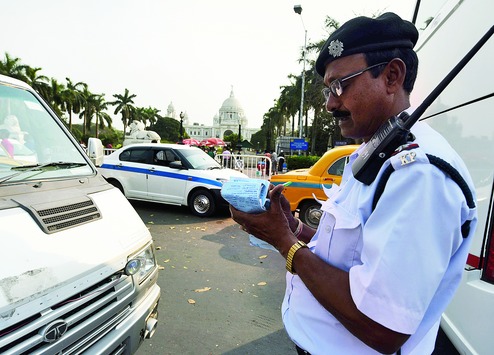
Calcutta: If a traffic cop ever points his mobile phone camera at your car, consider yourself shot-at-site.
Visual evidence is the new weapon against traffic transgressions as police try to phase out the system of manual citations that leaves the door ajar for disputes on grounds of human error.
Paperless citation for flouting road rules involves taking pictures of the vehicles in the act - the primary objective is to record the registration number - and enter the details in an app that immediately generates a text and sends it to the offender's registered number.
The system is part of a pilot project that aims to gradually do away with the standard pocketbook that traffic police officers carry to note down offences and the registration numbers of the vehicles that commit them.
In manual citations, many offenders do not receive the challans in their mailbox until much later or never.
Disputes are frequent, the most common explanation being that the car mentioned in a particular challan wasn't at the place where the violation was manually recorded. Citation based on photographic evidence will leave less doubt in the mind of an offender who might have unknowingly broken a traffic rule.
In December 2013, The Telegraph had highlighted 40-odd pending citation cases against three vehicles used by chief minister Mamata Banerjee. The impression being given then was that the VIP vehicles had been prosecuted by mistake.
Lalbazar's shift to paperless citation has started with familiarising the traffic rank and file with the Citation Case Entry app. The app has been given to sergeants, assistant sub-inspectors and constables.
All data inputs are collated at the traffic computer cell in Lalbazar, from where an e-challan is sent to the mobile number registered in the name of the owner of a vehicle. The entire process takes less than five minutes. "The idea is to alert the motorist or owner within five minutes of a rule being broken," an officer said.
Between February 19, when the pilot project was launched, till Monday, 8,666 vehicles had been prosecuted through this app. Five sergeants across the 25 traffic guards have been given a cash reward of Rs 1,000 each to encourage e-citations.
The challenge is to multi-task - managing traffic, taking photographs and registering the details in the app - at the same time.
All e-citation cases until the project started had been through cameras installed at some intersections.










